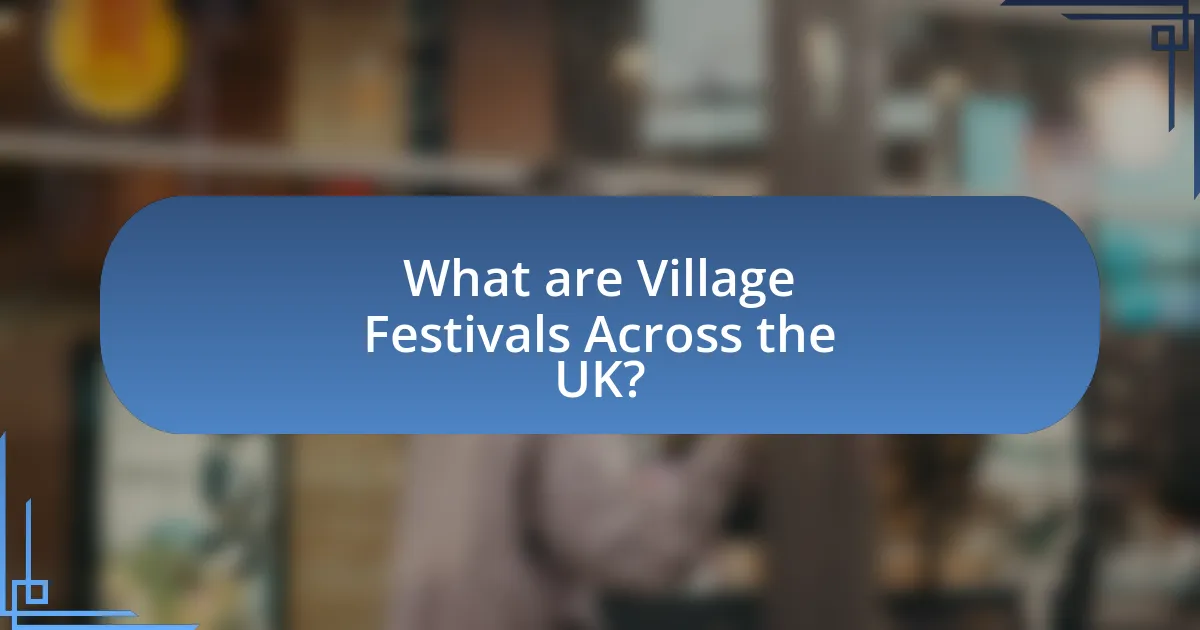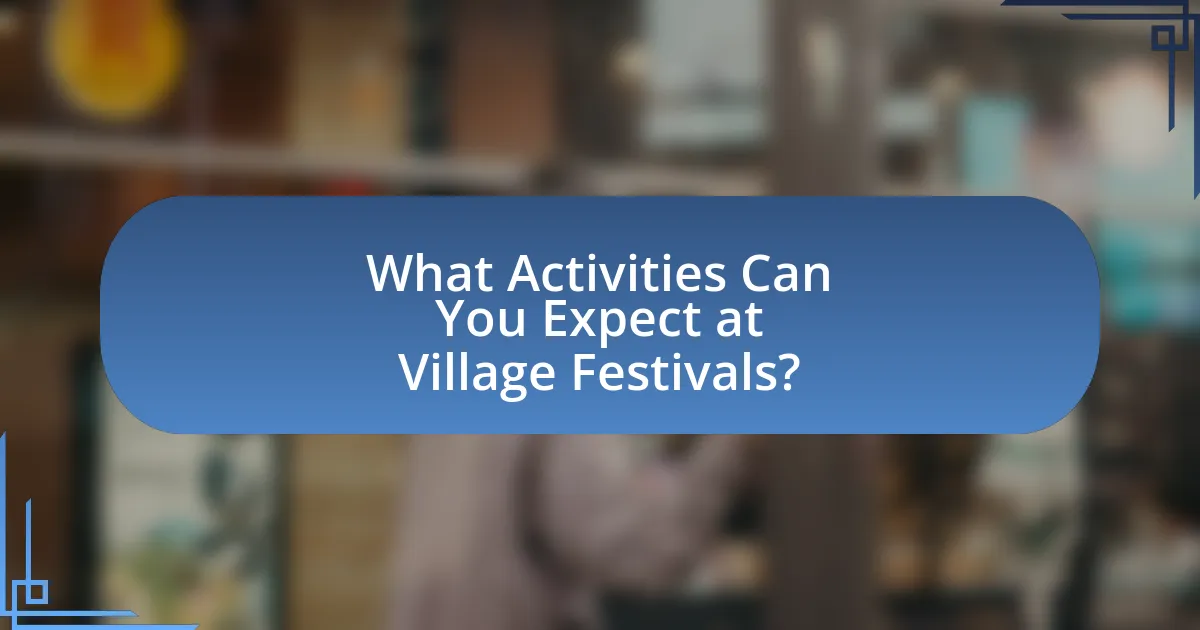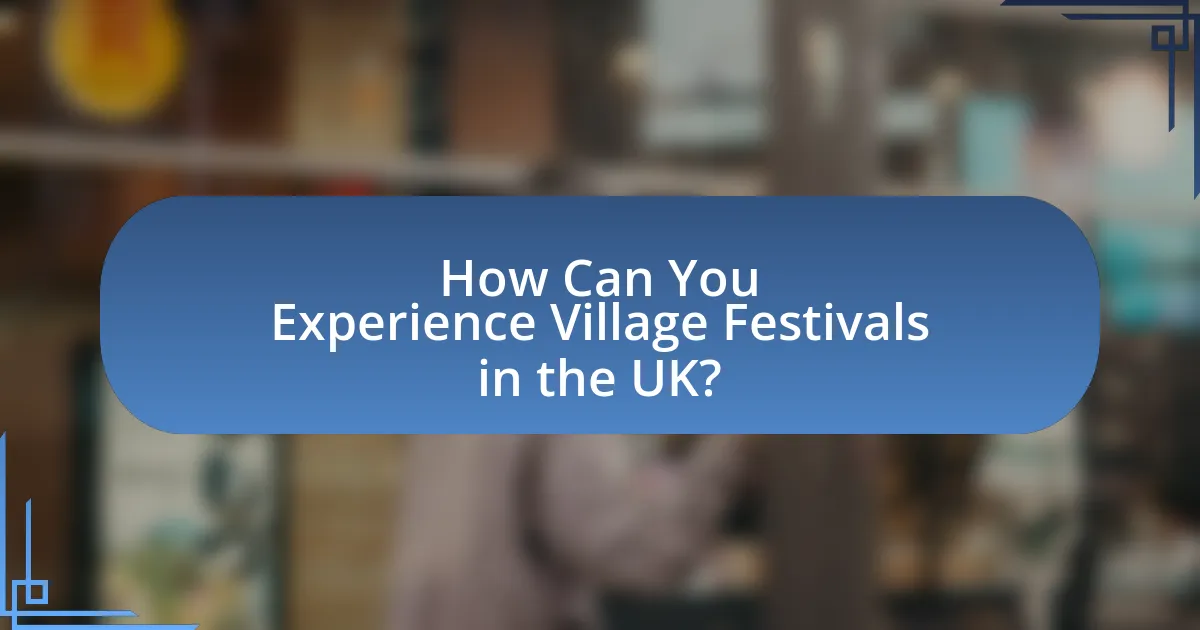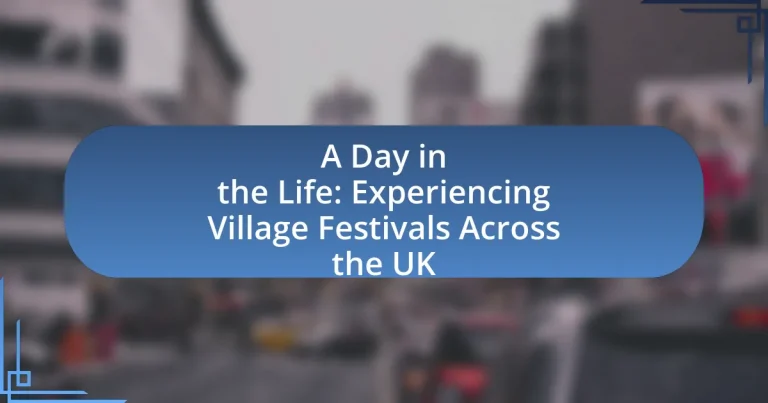Village festivals across the UK are community-driven events that celebrate local culture, traditions, and heritage through activities such as music, dance, food stalls, and games. These festivals vary in scale and significance, from large events like the Notting Hill Carnival to smaller village fairs, each reflecting unique customs and community values. Historically rooted in agricultural practices and seasonal observances, these festivals play a crucial role in fostering community spirit, preserving cultural identity, and supporting local economies. Attendees can expect a range of activities, including traditional performances, local cuisine, and interactive games, all contributing to a vibrant atmosphere that enhances social cohesion and engagement within the community.

What are Village Festivals Across the UK?
Village festivals across the UK are community events that celebrate local culture, traditions, and heritage, often featuring activities such as music, dance, food stalls, and games. These festivals, which can vary in scale from small gatherings to larger events, typically occur during the summer months and are organized by local residents or community groups. For example, the Notting Hill Carnival in London is one of the largest street festivals in Europe, showcasing Caribbean culture, while smaller village fairs, like the Chagford Show in Devon, highlight agricultural practices and local crafts. Such festivals foster community spirit and attract visitors, contributing to local economies and cultural preservation.
How do village festivals reflect local culture and traditions?
Village festivals reflect local culture and traditions by showcasing unique customs, practices, and community values specific to the region. These events often feature traditional music, dance, food, and crafts that are integral to the village’s identity, allowing residents and visitors to engage with the area’s heritage. For example, the annual Apple Day in Kent celebrates the local apple-growing tradition, highlighting the agricultural history and community spirit through apple-themed activities and local produce. Such festivals serve as a living expression of cultural continuity, reinforcing social bonds and preserving historical narratives within the community.
What historical significance do these festivals hold?
Village festivals across the UK hold significant historical importance as they often celebrate local traditions, agricultural practices, and community heritage. These festivals trace their origins back to ancient customs and rituals, such as harvest celebrations and seasonal observances, which were essential for agrarian societies. For instance, the origins of many festivals can be linked to pre-Christian pagan traditions that marked the changing seasons, such as Beltane and Lammas, which were later adapted into Christian celebrations. Additionally, these festivals serve as a means of preserving local history and fostering community identity, as they often include traditional music, dance, and crafts that reflect the unique cultural heritage of the area. The continuity of these practices over centuries illustrates their role in maintaining social cohesion and cultural memory within communities.
How do festivals vary from one village to another?
Festivals vary from one village to another primarily in their themes, traditions, and activities. Each village often celebrates unique historical events, agricultural cycles, or cultural heritage, leading to distinct festival characteristics. For example, a village may host a harvest festival focused on local produce, while another might celebrate a historical figure or event significant to its community. Additionally, the scale and style of festivities can differ; some villages may have large parades and music performances, while others might feature intimate gatherings with local crafts and food. These variations reflect the diverse cultural identities and histories of the villages across the UK.
Why are village festivals important to community identity?
Village festivals are important to community identity because they foster social cohesion and cultural continuity. These events provide a platform for residents to celebrate shared traditions, values, and history, reinforcing a sense of belonging. For instance, festivals often feature local customs, foods, and performances that reflect the unique heritage of the village, thereby strengthening community ties. Research indicates that participation in such communal activities enhances social networks and promotes collective identity, as evidenced by studies showing increased community engagement and satisfaction in areas with active festival traditions.
How do festivals foster community spirit and engagement?
Festivals foster community spirit and engagement by bringing people together to celebrate shared traditions and cultural heritage. These events create opportunities for social interaction, allowing residents to connect with one another, strengthen relationships, and build a sense of belonging. For instance, a study by the University of Exeter found that participation in local festivals significantly enhances community cohesion and encourages volunteerism, as individuals feel more invested in their community when they actively contribute to organizing and participating in these events. Additionally, festivals often showcase local talent and businesses, further promoting community pride and economic engagement.
What role do local businesses play in these festivals?
Local businesses play a crucial role in village festivals across the UK by providing essential goods and services that enhance the overall experience. They contribute to the local economy by selling food, crafts, and other products, which not only supports their own livelihoods but also fosters community engagement. For instance, a study by the Federation of Small Businesses found that local events can increase foot traffic by up to 30%, benefiting nearby shops and vendors. Additionally, local businesses often sponsor events or participate in organizing them, further solidifying their connection to the community and promoting a sense of local pride.

What Activities Can You Expect at Village Festivals?
Village festivals typically feature a variety of activities including traditional music performances, local food stalls, craft markets, and games for children. These events often showcase regional culture and heritage, with activities such as folk dancing, storytelling, and art exhibitions. For example, many festivals include competitions like tug-of-war or pie-eating contests, which engage the community and promote local traditions. Additionally, some festivals may host workshops where attendees can learn skills like pottery or weaving, further enriching the cultural experience.
What types of events are commonly featured at these festivals?
Village festivals across the UK commonly feature events such as traditional music performances, dance displays, craft fairs, and food stalls. These events celebrate local culture and heritage, often showcasing regional artists and culinary specialties. For instance, many festivals include competitions like tug-of-war or pie-eating contests, which engage the community and attract visitors. Additionally, activities for children, such as face painting and games, are frequently organized to enhance family participation.
How do traditional games and competitions enhance the festival experience?
Traditional games and competitions significantly enhance the festival experience by fostering community engagement and cultural heritage. These activities encourage participation among attendees, creating a sense of belonging and shared identity. For instance, events like tug-of-war or sack races not only entertain but also promote teamwork and friendly rivalry, which strengthens social bonds. Historical evidence shows that such games have been integral to village festivals for centuries, serving as a means to celebrate local customs and traditions. The inclusion of these competitions often attracts larger crowds, as they provide interactive entertainment that appeals to all ages, thereby enriching the overall atmosphere of the festival.
What role do food and drink play in village festivals?
Food and drink serve as central elements in village festivals, fostering community bonding and cultural expression. They provide a means for villagers to share traditional recipes and local produce, reinforcing cultural heritage. For instance, many festivals feature local specialties, which not only highlight regional flavors but also support local agriculture and economy. Additionally, communal meals and shared drinks create social interactions, enhancing the festive atmosphere and encouraging participation among attendees. This role of food and drink is evident in events like the annual Cheese Rolling Festival in Gloucestershire, where local cheese is celebrated and consumed, showcasing the importance of culinary traditions in community gatherings.
How do performances and entertainment contribute to the atmosphere?
Performances and entertainment significantly enhance the atmosphere of village festivals by creating a vibrant and engaging environment. These activities, such as live music, dance, and theatrical presentations, draw attendees together, fostering a sense of community and shared experience. For instance, studies show that live performances can increase emotional engagement and social interaction among participants, leading to a more festive and lively atmosphere. Additionally, the presence of entertainment acts as a catalyst for conversation and connection, making the festival more memorable and enjoyable for attendees.
What types of music and dance are typically showcased?
Village festivals across the UK typically showcase traditional folk music and dance. These events often feature genres such as Morris dancing, which involves rhythmic stepping and the use of props like sticks and handkerchiefs, and ceilidh music, characterized by lively tunes played on instruments like fiddles and accordions. Additionally, many festivals highlight regional variations, including Welsh folk music and Scottish Highland dancing, which reflect the cultural heritage of their respective areas. The prevalence of these music and dance forms at village festivals underscores their significance in preserving local traditions and community identity.
How do local artists and performers get involved?
Local artists and performers get involved in village festivals across the UK by applying to participate through festival organizers or local arts councils. Many festivals actively seek out local talent to showcase, often providing application forms or open calls for artists and performers on their websites or social media platforms. For instance, festivals like the Edinburgh Festival Fringe have specific guidelines and deadlines for local artists to submit their work, ensuring a diverse representation of talent. Additionally, community engagement initiatives often encourage local artists to collaborate with festival organizers, fostering a sense of ownership and cultural representation within the event.

How Can You Experience Village Festivals in the UK?
To experience village festivals in the UK, attend local events that celebrate community traditions, such as harvest festivals, fairs, and cultural celebrations. These festivals often feature local food, crafts, music, and activities that reflect the unique heritage of the village. For instance, the annual Apple Day in various villages showcases local produce and crafts, while the Lavenham Medieval Christmas Market offers a glimpse into historical festivities. Engaging with local tourism boards or community websites can provide schedules and details about upcoming festivals, ensuring an immersive experience in the vibrant culture of rural England.
What are the best times of year to attend village festivals?
The best times of year to attend village festivals in the UK are during the late spring and summer months, specifically from May to September. This period is characterized by favorable weather conditions, which enhance outdoor activities and gatherings. Many traditional village festivals, such as the Hay Festival in Hay-on-Wye (held in late May) and the Notting Hill Carnival in August, take place during these months, attracting large crowds and offering a variety of cultural experiences. Additionally, the summer months coincide with school holidays, making it easier for families to participate in these community events.
How can you find a schedule of upcoming festivals?
You can find a schedule of upcoming festivals by visiting local tourism websites, checking community bulletin boards, and exploring social media platforms dedicated to event listings. Local tourism websites often provide comprehensive calendars of events, including village festivals, while community bulletin boards may feature flyers and announcements. Social media platforms, such as Facebook and Instagram, frequently have event pages where organizers post details about upcoming festivals, making them easily accessible to the public.
What should you know before attending a village festival?
Before attending a village festival, it is essential to understand the festival’s schedule, location, and cultural significance. Village festivals often feature specific dates and times for events, which can include parades, music performances, and local food stalls. Knowing the location helps in planning travel and accommodation, as many festivals take place in rural areas with limited access. Additionally, understanding the cultural significance of the festival can enhance the experience, as many festivals celebrate local traditions, history, or agricultural practices, providing insight into the community’s heritage.
What tips can enhance your experience at village festivals?
To enhance your experience at village festivals, actively engage with local traditions and participate in activities. Engaging with local customs allows for a deeper understanding of the community’s culture, which is often showcased through traditional music, dance, and food. For instance, many village festivals feature unique local dishes that reflect regional ingredients and culinary practices, providing an authentic taste of the area. Additionally, participating in workshops or demonstrations can offer hands-on experiences that enrich your visit. Research indicates that immersive experiences at cultural events lead to higher satisfaction levels among attendees, as they foster connections with the community and create lasting memories.
How can you engage with locals and participate fully?
To engage with locals and participate fully in village festivals across the UK, actively join in festival activities such as traditional dances, food tastings, and local games. Engaging in these activities fosters connections with residents and enhances the overall experience. For instance, participating in a Morris dance or helping with local food preparation allows for direct interaction with community members, promoting cultural exchange. Additionally, volunteering for event organization or attending workshops can deepen involvement and understanding of local customs.
What are some common etiquette practices to follow at these events?
Common etiquette practices to follow at village festivals across the UK include respecting local customs, being polite to vendors and fellow attendees, and adhering to event rules. Attendees should greet locals and engage in conversations, as this fosters community spirit. Additionally, maintaining cleanliness by disposing of waste properly is crucial, as many festivals emphasize environmental responsibility. Observing queue etiquette when waiting for food or activities is also important, as it shows respect for others’ time. These practices enhance the overall experience and contribute to a positive atmosphere at the event.


